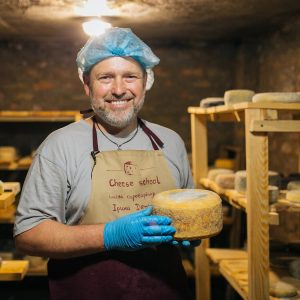Oleksandr Makukhin is the owner of a farming household in the village of Novovoznesenka in Zaporizhzhia. He breeds goats, sheep, and cows, making different kinds of cheese from their milk, including soft, hard, with varying maturity and even with mold. Oleksandr is one of those people who has found success in the cheese-making business pretty quickly and one of a few cheesemakers who was able to withstand difficult economic conditions and develop their own business without any outside help.
Until 2012, Oleksandr Makukhin had a business connected with the supply of thermal insulation materials to Ukrainian factories. However, since 2008 the things took a downturn and Oleksandr had to look for other sources of income. The businessman became interested in farming and cheese-making in 2010 and started studying on his own with the help of books and seminars. In 2016 he graduated from cheese-making school and became a professional cheesemaker. At first, the man prepared cheese at home but later built his own cheese factory in the village of Novovoznesenka near Zaporizhzhia.
Like most cheesemakers, Oleksandr started by preparing brynza. He also made halloumi, which is the cheese that originally comes from Cyprus and can be grilled or fried and eaten with jam or honey. After that, there was Caciotta — the Italian table cheese that looks like parmesan when it is mature. It was this cheese that served as the breakthrough of Oleksandr’s talent for cheese-making.
— Before the first year of study at a cheese-making school I had already made cheeses but only gave them to my friends and relatives, but I thought that they probably did not want to offend me by telling me that the cheeses were not tasty. Later, I went to the place where real professionals taught us, I presented my cheeses and realized that I was able to do something, which added to my confidence and enthusiasm.

After studying at the cheese-making school, the farmer already had a good foundation and was not afraid of experimenting to invent his own recipes. However, the man does not want to reveal his secrets: there are the recipes that he adapted to himself and that are different from those that can be found on the Internet. Oleksandr called his brand “Cheeses from the farmer” and it is already recognizable at the Ukrainian fairs.
In Novovoznesenka, Oleksandr Makukhin had 4 hectares of land, but the maintenance and arrangement of a plot of this size required considerable funds. Therefore, the idea was to create a mini-farm on a smaller plot of land while refining the cheese-making business. The farmer has equipped his cheese factory in a house on this site and comes there almost every day from Zaporizhzhia to prepare cheese.
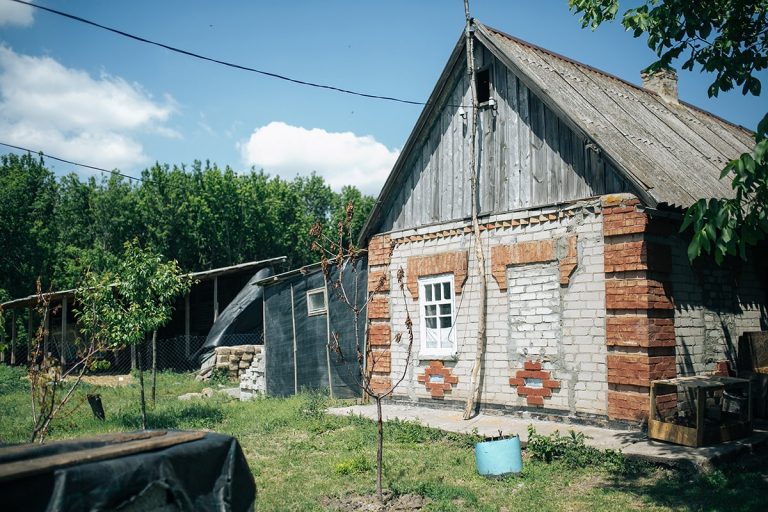
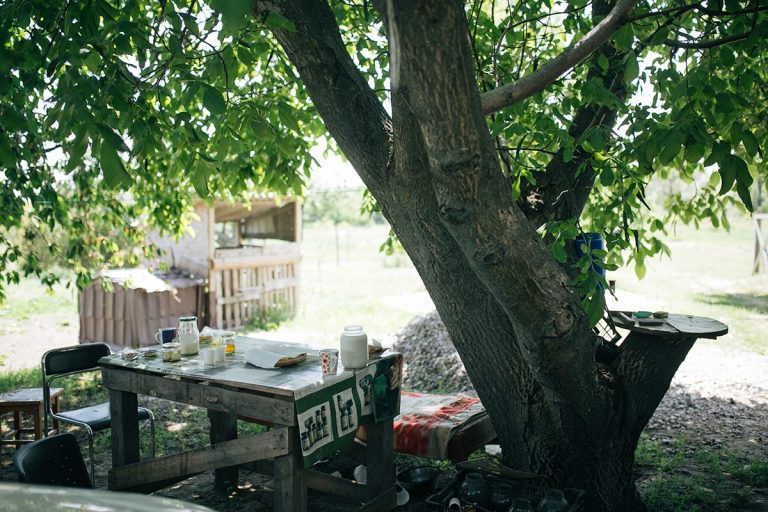
slideshow
Initially, Oleksandr had no practical skills or experience except his childhood memories about how his grandmother looked after animals in the village. Oleksandr constantly absorbed information and gained knowledge in the process of working a farm. He was mastering the skills of properly caring for a goat herd based on the experience from French farmers. One of his plans for the future is to upgrade technical equipment and improve animal care.
Oleksandr was not demotivated by either the lengthy bureaucratic procedure of procuring the land for his cheese factory or the lack of funds at the beginning of his own business journey. The cheese factory is run on gas, not electricity, because the latter is often turned off, which can disrupt the cheese making process.

Currently, Oleksandr is an “artist” in the cheese-making business: he boasts of the varieties of cheese with mellifluous names, such as Crottin de Chavignol (mature soft cheese with white molds) or Labneh, which he advises to eat from glasses because it is soft and delicate cream-cheese made from homemade yogurt.
— Goat cheese, like milk, is more useful than the cow’s and tastes better. I think that we should teach people the culture of goat cheese consumption.
Oleksandr does not trust cheeses from shops because he is never sure about what has been added. Moreover, he states that such cheeses have no ‘soul’:
— I’m trying to make the cheeses I like. If I like them, then I hope other people will like them too.
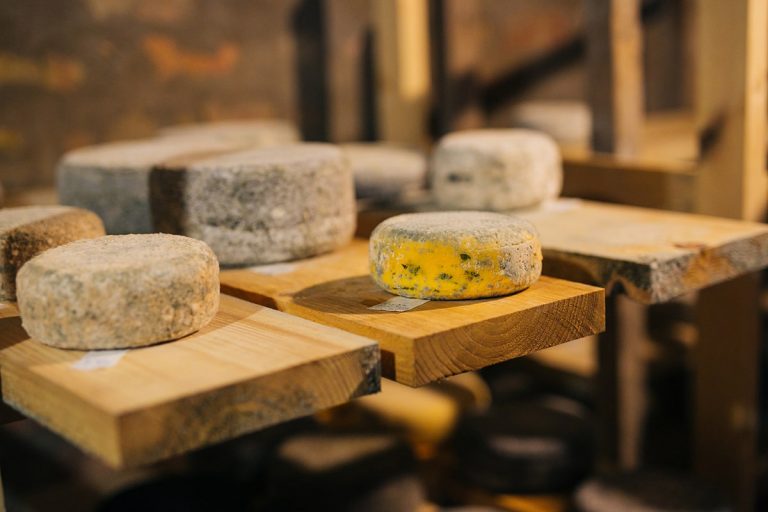
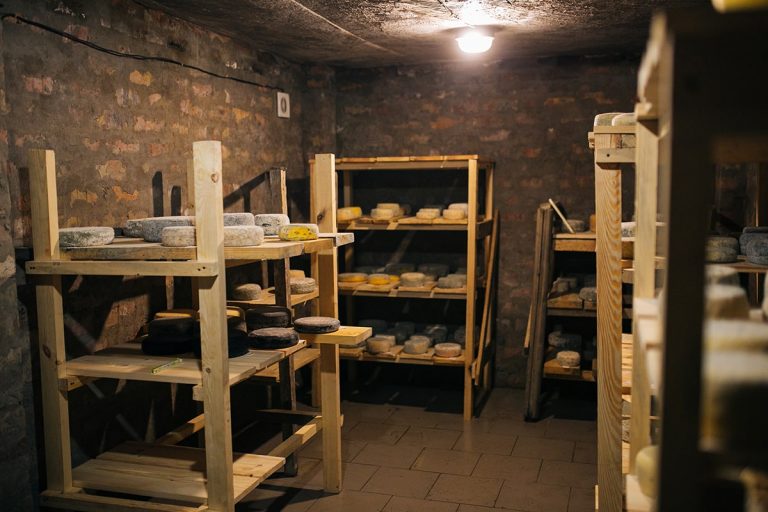
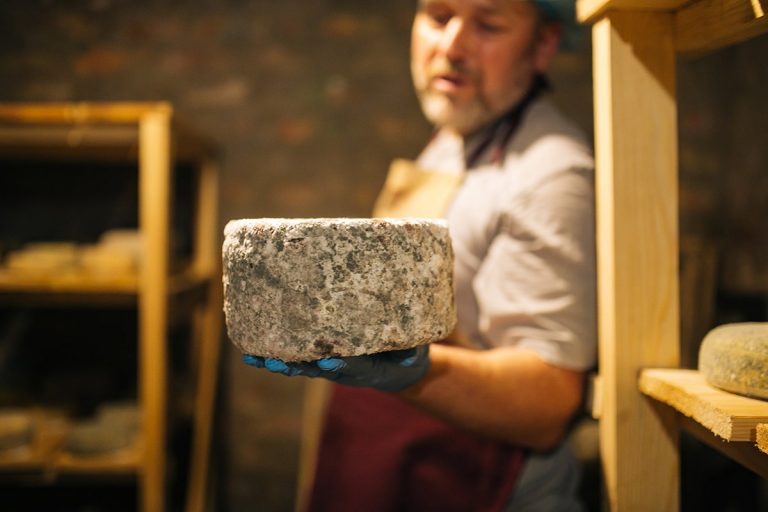
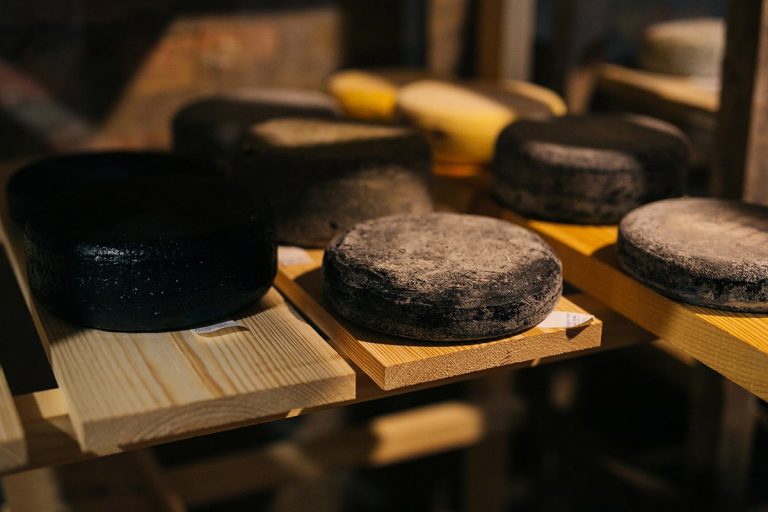
slideshow
The man namessome cheeses in his own way. The well-known names sometimes say nothing to potential buyers (Oleksandr works in the Ukrainian market). For example, if we name a cheese in honor of a village, it immediately becomes “closer” to consumers. The same situation was with the young smoked cheese called “Voznesensky” because of the way it’s named after the village of Novovoznesenka. By the way, it acquires its perfect condition over time:
— There are a lot of people who do not like stinky cheeses, those that have a rich taste. They like simpler kinds of cheeses, for instance, a young Caciotta— but when I add fenugreek, it tastes nutty and people like it.
Fenugreek
is an annual plant in the family Fabaceae, with leaves consisting of three small obovate to oblong leaflets.Although dairy “material” is one and the same for all cheesemakers, the cheeses obtained are always different because they are artfully crafted by a master. Oleksandr compares the processes of cooking cheese and borshch whilst laughing:
— Take two, three or five housewives, give them pieces of meat and tell them to cook borshch according to one recipe. They will cook different borshch. The same is with cheese — I use ordinary milk, but a different product comes out.

Cheese-making and consumer interaction
Cheese-making is a long and time-consuming process. Pasteurised milk and enzymes (also known as rennet)should form a clot, which should be then gently stirred, as if sliced. At that point, a vital process then takes place: whey is drained and curd is separated. To release excess whey, it is necessary to form cheese blocks under a press. The cooked cheeses are then covered with latex and sent for ripening. Each cheese goes through different stages after this process and matures for different amounts of time.
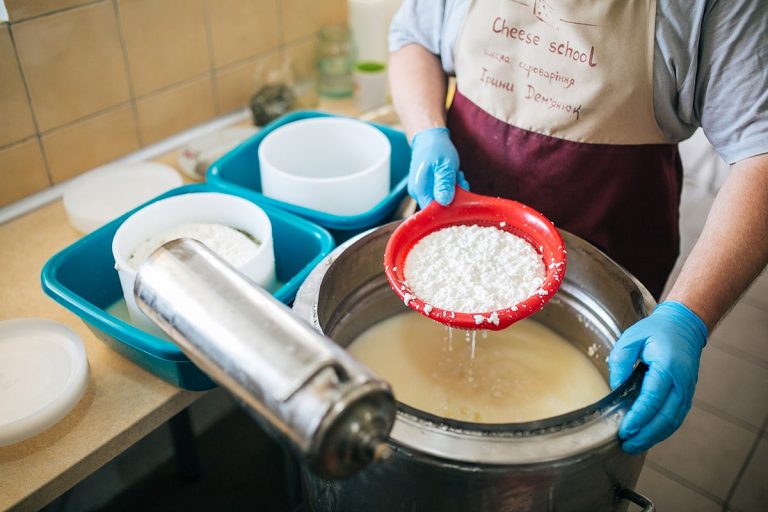
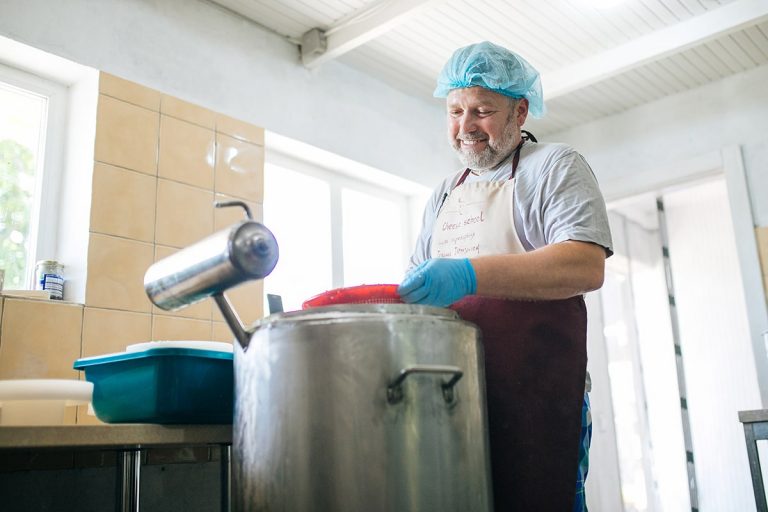
slideshow
The trend of cheese-making, especially of hard and aged cheeses, is only just emerging in Ukraine. That explains why cheese factories are sporadic and rarely communicate with each other. Oleksandr knows a few of his colleagues and meetings with them are usually not planned: he happened to see one during the purchase of goats and a few others at a goat-keepers’ forum. The man interacts with the farmers of Zaporizhzhia and is inspired by their accomplishments.
A small number of cheese enterprises can explain weak competition, but the demand for the product is significant. However, not everyone can afford to buy a local farm product because of its high cost, so the business is developing slowly.
The farmer points out that the absence of competition can be explained by regional features, namely the climatic ones. Another thing is cheese factories near Kyiv, Galicia and Transcarpathian region, where the conditions are more favorable as there is no drought and soils are fertile enough for the juicy grass:
— We have very few people in the area who produce cheese. They can be counted on the fingers of one hand. Maybe, there are only two or three of them. Others mainly work near Kyiv and in Western Ukraine. I think that’s why we have less grass. Moreover, we stockpile hay: we have finished the first mowing of grass because the second one is highly unlikely as there will be no rain.
We have very few people in the area who produce cheese. They can be counted on the fingers of one hand. Maybe, there are only two or three of them. Others mainly work near Kyiv and in Western Ukraine. I think that’s why we have less grass. Moreover, we stockpile hay: we have finished the first mowing of grass because the second one is highly unlikely as there will be no rain.
— Once the French have even tasted cheeses and said that it is a very interesting phenomenon: they do not have such conditions when the grass is juicy all summer long despite the dry climate. It is May now, and the grass will be dry in mid-July or June.

The main thing is that Oleksandr is sure about what he is doing as he has no doubts about the feasibility of cheese-making. Even informing consumers contributes to the hassle.
— It is necessary to acquaint people with cheese and ensure that there is a constant demand for it. At the moment, everyone mostly sells them at fairs. Probably, there are individuals who have opened their businesses before. “Good Farm” makes great products and supplies them to the supermarket “Silpo.”
“GOOD FARM”
A family run cheese farm in the village of Ivki, near Boguslav.Oleksandr does not mind delivering his products to the mass market, but he has no confidence that they will be bought: it is important to talk with potential clients and explain why these craft cheeses are better than the factory ones.
— I like to eat natural products that have no “chemicals”. The people at the fairs know me, have my contact information and order my goods. I deliver cheeses to several restaurants because it’s become fashionable to introduce craft cheeses to their menus.
Currently, Oleksandr’s products are also available online. The assortment will satisfy even the most demanding buyers. You can find everything in his online shop from the usual Alpine hard cheese made from goat’s or cow’s milk to the exquisite Belper Knolle — a soft spicy cheese with a mixture of peppers. Until recently, these cheeses could only be bought in Italy or France but are now produced by the Ukrainian cheese-makers.

Development thrusts
Cheese production requires considerable investment: a cheese-maker must have a milk cooler and a premises that meets all state standards. Expanding the production is financially difficult and not always cost-effective. Of course, we cannot compete with France, where there are more than a thousand cheese factories and each one has its own place in the market. But small craft enterprises also exist in Ukraine: read our materials about the success of goat farms, Transcarpathian herdsmen-cheese-makers, as well as Selyska cheese factory that has changed the fate of the whole village.
One of Oleksandr’s development goals is the opportunity to breed animals and take care of the herd of goats, which the farmer breeds himself. He also plans to produce new types of cheeses, including the Swiss one and parmesan.
— Cottage cheese and brynza are well-known cheeses. In the past we did not have the cheeses that we now begin to prepare- hard, aged (these are the European cheeses: Italian, Dutch, Swiss). I think we live in the time when we should teach people to taste these cheeses and establish traditions.
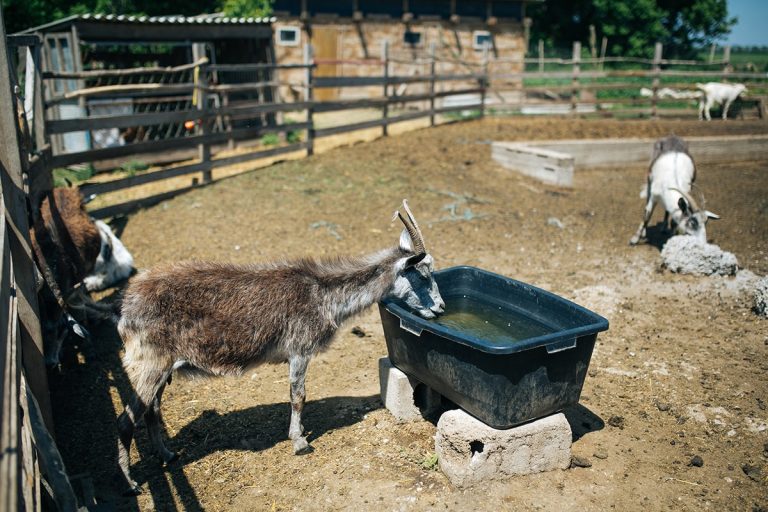
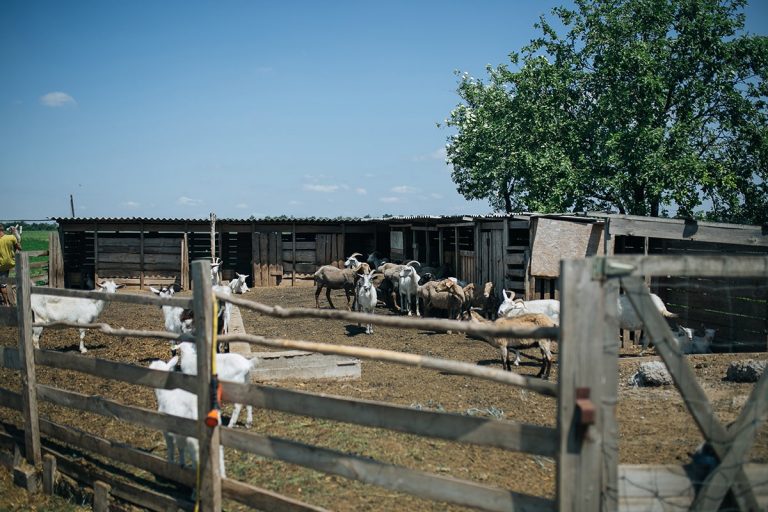
slideshow
Oleksandr hopes that his enterprise will benefit others. When he was just starting his own business, he planned to invite local residents to work at his cheese factory. However, people rarely agree. Novovoznesenka is a small village with several dozens of houses, where before the start of the cheese factory having a business meant to have apiary or keep livestock. Most residents go to the city to make money, others are afraid to work on a private enterprise because of instability.
— It is very difficult to find people who would help. Why? Because you need to work! There are hard-working people who decide to work for themselves and not for someone — but I do not sink into despair. I hope that there will be people who will help and learn to prepare cheeses with pleasure.

The farmer has developed his business from scratch. He is still building the new premises by himself, gradually purchasing equipment. Oleksandr says that he works for people and puts quality above all. Trust and appreciation from buyers are the greatest joy for the craftsman.
— Why do our cheeses seem to be different from others? What’s the secret? The secret is that my cheeses contain a part of my soul.

